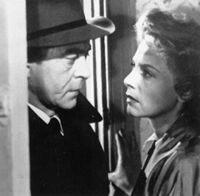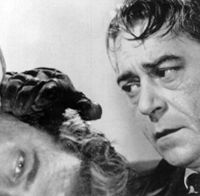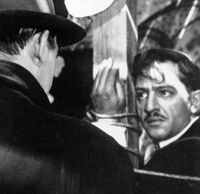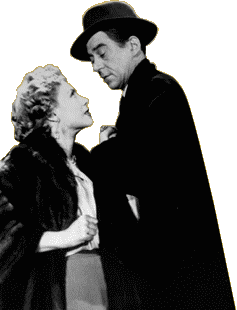|
Rififi is French slang for "rough and tumble" and while the word is spoken, or sung rather, in only one scene, the feeling that it conveys -- the sense of angry, downtrodden masculinity -- pervades the entire movie. Relentlessly copied, and itself borrowing liberally from its antecedents, Rififi is pulled off with the same cool efficiency as its climactic centerpiece, an elaborate jewel heist that occupies 33 dialogue-free minutes. Released in 1955 and again last year in a restored print, Rififi is now available on DVD from the Criterion Collection, and it includes a half-hour interview with the director, Jules Dassin. | | 
Jean Servais and Marie Sabouret in Rififi. | |
The movie’s reputation is virtually untarnished, but in a recent critical backlash, several American critics have attacked what they perceive as the movie’s shaky noir credentials. Neither fully French nor fully American in spirit, Rififi borrows from each country’s film heritage to create something that technically speaking may not be film noir, but which all critics seem to agree is dark, disturbing, and entertaining.
The circuitous route Rififi took to the screen is probably as famous if not more so than the movie itself. Its director Jules Dassin, an American, came up through Hollywood’s studio system making B-movies and later thoughtful tough-guy films such as Brute Force and The Naked City. When he was named a Communist by HUAC, Dassin famously fled to England, where he filmed Night and the City, and then to France, where he struggled to find work for several years. Finally in 1955, a French producer named Henri Berard approached him to adapt a popular pulp novel entitled Du Rififi Chez Les Hommes by Auguste Le Breton. The details of the adaptation and filming are best left unspoiled; Dassin, in an interview conducted in his native New York just last year, recounts his many anecdotes with unforced humor and a surprising lack of bitterness. Like Rififi’s anti-hero Tony Le Stephanois, an aging ex-con who reluctantly agrees to one last heist, Dassin projects a kind of weary fascination with the movie that would ultimately rehabilitate his career.
| | 
DVD cover artwork for Rififi.
[click photo for larger version] | |
Tony is played by French actor Jean Servais who is probably unfamiliar to most American audiences but whose face is strangely inviting despite its gaunt, haunted shape. Tony has just been released from prison when his friends Jo (Carl Mohner) and Mario (Robert Manuel) propose to rob a jewelry store. Refusing at first, the exhausted and sickly Tony agrees only after a violent encounter with his ex-girlfriend Mado (Marie Sabouret), who is now the moll of a rival hood named Grutter. The movie’s pacing to this point is remarkably economic. Hardly a scene is wasted, and before very long, Tony and his gang are performing reconnaissance, rehearsing their moves, and mapping their course. Dassin, like Tony, works like an expert technician. Their dedication to their trade is at times cold and impersonal, but the very lack of emotion suggests the unspoken passions each has for his own craft.
The famous burglary sequence at the center of Rififi has historically drawn comparisons to the sequence in Bresson’s Pickpocket in which a team of Parisian pickpockets works a busy race track. The wordless intensity of these scenes is hypnotic, and for a while, we feel as if we’ve left the fictional movie behind us and entered a documentary about these characters. | | 
Carl Mohner (left) and Jean Servais (right) in Rififi. | |
So mesmerizing is the action that one critic complained that Rififi glamorizes the art of burglary. Dassin replied that by showing every detail, from their entering the shop through a hole they cut in the ceiling, to disarming the alarm system, to cutting open the safe with a cumbersome gadget that resembles a large can opener, the movie demonstrates to us what a difficult and unglamorous process burglary really is. What we also register, though we hardly realize it as we watch, is the level of trust these men have for one another. Each must trust that the others have done their job; there’s no room for doubt or equivocation. The heist scene may very well be the most emotional scene in the movie.
The theft is followed by a long denouement in which fatal flaws come to bear and greed is ultimately punished. In the tradition of noir, everyone must suffer, and when Jo’s young son is kidnapped by Grutter, it is the beginning of the end for Tony and the gang. A climactic shoot-out between Tony and his nemesis feels a bit perfunctory, but the following scene, in which Tony races against the clock to prevent Jo from returning the stolen loot, is a brilliant piece of camera work and editing. Alternating between point-of-view shots and long shots of narrow Parisian streets, Dassin discombobulates our sense of space and time. Tony, who’s been shot, is speeding in his car towards his inevitable fate. It’s the first time in the movie where he’s lost control, and Dassin’s style is the perfect mirror. 
Jean Servais (left) and Jules Dassin (credited as Perlo Vita) in Rififi. | |
Though not traditionally a noir city, Paris convincingly takes on different personas throughout the movie. During the heist sequence, which is set at night, its dark alleyways are effectively sinister, and by morning, as signs of civilization start to emerge from its corners, the city becomes a minefield of potential witnesses.
Whether this qualifies Rififi as authentic film noir seems besides the point. Already loved by film critics, Rififi stands poised to be discovered by contemporary American audiences who, thanks to this DVD release, can choose between a subtitled and an English dubbed version. The movie’s international appeal (it won the Best Director’s prize at Cannes) lies squarely in its documentary-like honesty. With precision, it reminds us without saying a word how the most complex tasks can be reduced to simple, spare movement.
Rififi is now available on DVD from the Criterion Collection in a new digital transfer created from restored film elements. The disc includes an exclusive video interview with director Jules Dassin; production design drawings and stills; and a theatrical trailer. In addition, the disc includes an optional English-dubbed soundtrack. Suggested retail price: $29.95. For more information, check out the Criterion Collection Web site.
Rififi is also available (without the extras) on VHS from Home Vision Entertainment. Suggested retail price: $29.95. For more information, check out the Home Vision Entertainment Web site.
|







